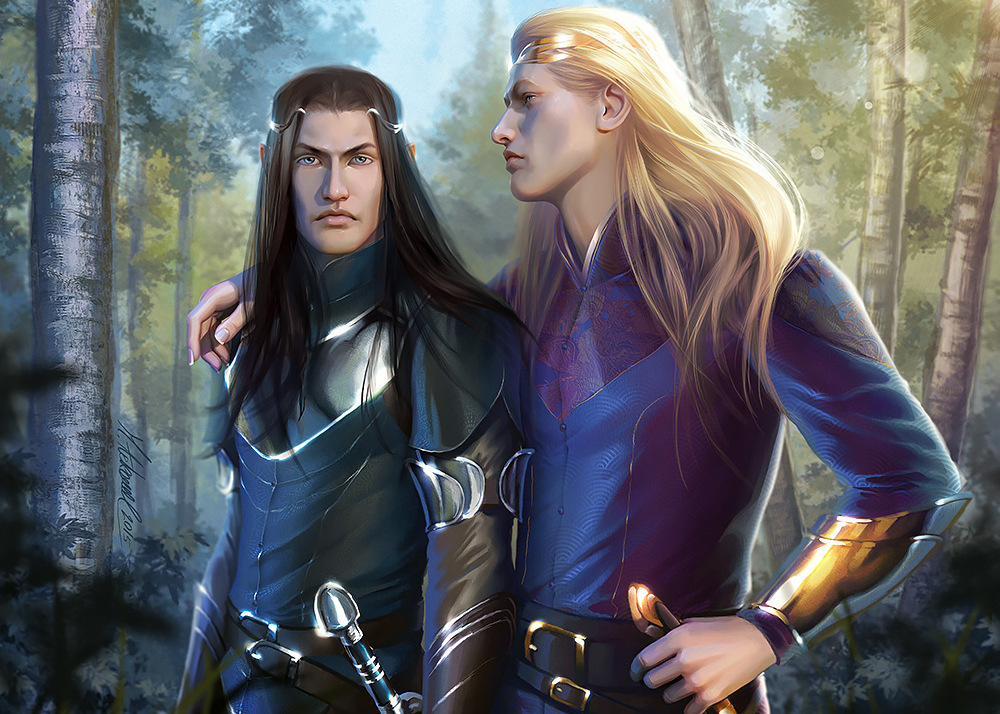The Fellowship of the Ring by J.R.R Tolkien (Harper Collins 1991) pp. 367-369
Farewell! Namárië! This is the last word spoken by Galadriel as the three boats that hold the members of the Fellowship float down the Silverlode to its confluence with the Anduin and so away from the earthly paradise of Lothlórien, into the empty lands beyond and all the adventures that lie before each one of them; adventures that lie before their feet but which they cannot know except as they take each step of the way.


Galadriel’s farewell is a song that she sings to them in “the ancient tongue of the Elves beyond the sea”, in Quenya, a language spoken both by the Noldor of whom Galadriel is a Queen and by the Vanyar. It is the language that Gildor and his party speak in the Shire when they meet Frodo, Sam and Pippin at the beginning of their journey and it is a language of which Frodo has little knowledge. But, as T.S Eliot wrote on the subject of language, communication goes deeper than understanding, and in a documentary on Eliot’s poem, The Wasteland, the comment is made that it is the music of Eliot’s language that communicates before any understanding of the text. Perhaps it is to this that Tolkien refers when he speaks of “the way of Elvish words” that they remain “graven” in Frodo’s memory.
Throughout the years of her long sojourn that “have passed like swift draughts of the sweet mead in lofty halls beyond the West” Galadriel has spoken with her husband and with her people in Sindarin, the language of the Elves who never made the journey to Valinor, but now she pours out her heart in the language of her own people. For Galadriel has long nurtured a divided heart in which, as we read of her in Unfinished Tales “there dwelt in her the noble and generous spirit of the Vanyar, and a reverence for the Valar that she could not forget.” But there has also lain within her the part that she played in the rebellion of Fëanor and the Noldor, when although she opposed Fëanor in the kinslaying of Alqualondë nevertheless she still went with her people to Middle-earth against the command of the Valar and at the end of the First Age refused the pardon that the Valar extended to all who had been a part of the rebellion of Fëanor but had fought against Morgoth. As Tolkien says of her in Unfinished Tales “she had dreams of far lands and dominions that might be her own to order as she would without tutelage”. It was these dreams that began to take shape in her heart in the form of a thought as to what she might do if ever the Ring of Power might fall within her reach.
It was this thought, born of her ancient dreams, but dreams perhaps and even thoughts that had lain dormant through her long practice of the rejection of evil, a practice aided by Nenya the Ring of Adamant, that suddenly returned to her with almost overwhelming force when Frodo offered her the Ring at the episode of her mirror. But Tolkien tells us, when the moment of testing came “her wisdom was full grown and she rejected it, and passing the last test departed from Middle-earth for ever”.
That was to be her final destiny but at this moment, the moment of her singing her farewell song to the Fellowship, she has no knowledge of the pardon that she will receive and so all that they (and we also) can hear is her heartbreaking lament and her longing.
“Now lost, lost to those from the East is Valimar! Farewell! Maybe thou shalt find Valimar. Maybe even thou shalt find it. Farewell!”

Was it to Frodo most of all of that company to whom she sang those words? It is Frodo, amongst all of them, that the longing for healing and of peace is strongest, a longing revealed in his dreams in the House of Tom Bombadil and a longing revealed, perhaps also, in the graving of Galadriel’s song upon his memory. These words stay within his heart upon every step of his journey to Mordor and maybe they become, against even his conscious thought, a lode star beyond the “end of all things” in the Cracks of Doom in Orodruin that will carry him, along with the faithful and loving service of Sam, both to that terrible moment and beyond it also. Maybe Frodo will find it.














